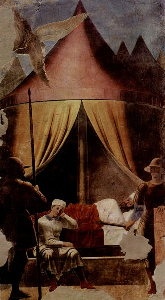
Domestic bliss at the RFH The
supporting programme in the first half began with The Frescoes of Piero Della Francesca by
Bohuslav
Martinu : composed in 1955 it was inspired by a series of frescoes in the church of San Francesco in
Arezzo, Italy, which present scenes from mediaeval legends about the supposed
origins of the wood for the Cross (on the right is The Dream of
Constantine). The score shimmers with mysticism: Martinu's individual style
and use of a large orchestra takes us into a half perceived world of legend and
mystery. The
supporting programme in the first half began with The Frescoes of Piero Della Francesca by
Bohuslav
Martinu : composed in 1955 it was inspired by a series of frescoes in the church of San Francesco in
Arezzo, Italy, which present scenes from mediaeval legends about the supposed
origins of the wood for the Cross (on the right is The Dream of
Constantine). The score shimmers with mysticism: Martinu's individual style
and use of a large orchestra takes us into a half perceived world of legend and
mystery.A concert with two little-known works such as these needs a crowd-pleaser to get the audiences in: this time it was the Mendelssohn E minor Violin Concerto, played by Anne-Sophie Mutter - too fast, as usual, sometimes at the expense of accuracy. It got rapturous applause, but why almost every modern violinist thinks the final movement has to be taken as fast as they possibly can is a mystery to me. It's a warm and charming work, but not the way it was played yesterday. Posted: Sun - January 25, 2009 at 09:17 AM by Roger Wilmut |
Quick Links
About Me:
Roger Wilmut XML/RSS Feed
MY PODCAST
Archives
Calendar
Blogroll
WEBRINGS
Statistics
Total entries in this category: Published On: Mar 11, 2016 05:00 PM |
||||||||||||||||||


